They say history is written by the winners. This has never been truer than in the case of the Monday Night War which pitted WWE and WCW's flagship Monday Night broadcasts, WWE Raw and WCW Nitro against each other for six years between September 1995 and March 2001. WWE has gone on record many times to say they defeated WCW due to their own smart business and booking decisions, which forced WCW to fold, leaving the mighty sports entertainment powerhouse free to buy their competition for a paltry $3 million, plus legal expenses, in spring 2001.
While WWE undoubtedly played a part in putting immense pressure on WCW with a well-booked promotion and top line, youthful main event stars such as Stone Cold Steve Austin and The Rock, the truth of the matter is that WCW's demise was primarily brought about by themselves. WWE has stated many times that WCW never created their own stars during their financially successful 1994-2001 period and instead bought ready-made names from WWE.
While there is some truth in that statement as the signings of Hulk Hogan, Macho Man Randy Savage, Rowdy Roddy Piper, Kevin Nash and Scott Hall made a huge difference to WCW's bottom line, the assertion that they developed no stars of their own during that period is completely false. Between 1994 and 2001, WCW made stars out of Brian Pillman, Diamond Dallas Page, Goldberg, Chris Jericho, Chris Benoit, Booker T, Scott Steiner as well as an entire Cruiserweight division boasting such names as Eddie Guerrero, Dean Malenko and Rey Mysterio Jr.
Where WCW went wrong is that few of those names broke through the glass ceiling and became bonafide main event stars, with WCW being forced to feature the likes of Hogan and Savage on top, far past their prime due to their contracts featuring creative control clauses. This list looks at how WWE won the Monday Night War, with credit going to their own decisions and also the catastrophic, counterproductive calls WCW made in relation to their own demise.
WWE has no plans for these former AEW wrestlers? Here's why!
#5 The Montreal Screwjob (November 9, 1997)
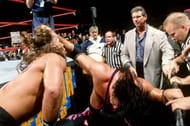
The Montreal Screwjob was a defining moment in the WWE vs. WCW war, but not in the way most expected at the time. When then-WWE champion Bret 'Hitman' Hart was screwed out of the WWE title for real by WWE owner Vince McMahon three weeks before he was due to join WCW, many thought that would be the death knell for WWE.
In November 1997, WCW was just one month removed from putting on its most financially successful pay-per-view event ever, Starrcade 1997; headlined by a match 18 months in the making between WCW World Champion, Hollywood Hulk Hogan and Sting. The event was the joint richest in history at that point, equalling Wrestlemania V, headlined by Hogan and Savage in 1989, with 650,000 buys.
With its main event crew consisting of Hogan, Savage, Piper, Sting, Ric Flair and now Bret Hart, WCW was undoubtedly the number one promotion in the wrestling world. WWE, meanwhile, had Shawn Michaels and The Undertaker and no one else. Stone Cold was recovering from a career-threatening neck injury and had not yet entered the headline bracket. WWE's Survivor Series outperformed WrestleMania, but still only drew 250,000 buys with their two biggest draws in Hart and Michaels.
WWE was in terminal decline and WCW were the major players in wrestling. However, the screwjob turned WWE owner McMahon into his company's premier heel. Pit opposite Stone Cold, who against all odds was recovering sufficiently from his neck problem, the Austin/McMahon program struck a chord with the working classes of America, with the redneck Austin standing up to his tyrannical boss, week after week, usually to great success.
With The Rock accelerating up the undercard as Intercontinental Champion, and a new D-Generation X forming post-WrestleMania XIV, WWE suddenly and unexpectedly had young stars and hot programs whereas WCW's aging main event crew almost overnight became passe. To make matters worse for WCW, they neglected to make the most of their new acquisition, Hart.
Following the screwjob, Hart became the hottest star in wrestling but that momentum dwindled when WCW inadvertently made him look like a fool at his WCW pay-per-view debut, Starrcade (due to Hogan-related meddling) and was reduced to upper mid-card level, so Hogan and Savage and the like could continue to wrestle in the headline positions. That proved to be one of several fatal decisions the company would make over the next few years.
One of the constant criticisms that the WCW had to endure throughout its reign was how they mismanaged talent. Plenty of young superstars jumped ship to the WWE purely because of lack of opportunities in the WCW.
If someone with Bret Hart's legacy did not get the attention he deserved with the brand, then imagine the plight of every other man in the locker room who did not side with the top brass of Ted Turner's promotion.
#4 The Austin/McMahon match that never was (April 13, 1998)
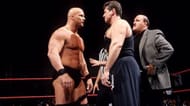
83 weeks. That's how long the uninterrupted winning streak of WCW Nitro over WWE Raw was. For 83 straight weeks, Nitro won the wrestling war. However, that all changed on April 13, 1998. Fresh off his world title victory over Shawn Michaels at WrestleMania XIV, Stone Cold Steve Austin was embroiled in a war of words with the owner of WWE, Vince McMahon.
The discord between owner and champion escalated in the opening segment of Raw which saw Stone Cold challenge his boss to a match with the WWE title on the line. It played into a showlong storyline in which McMahon first did some soul searching before accepting Austin's challenge, then did some rudimentary wrestling training with his corporate team of Gerald Brisco and Pat Patterson. All of that led to the eventual title match in the main event slot where Austin and McMahon were interrupted by Dude Love, who would lay Stone Cold out to end the show.
The effect of this sole rating victory for WWE had a far greater effect on WCW than it should have done. The ratings loss spooked WCW boss Eric Bischoff, who threw much of WCW's long-term booking into the waste bin and instead became obsessed with short-term booking gains to reverse the (slight) rating decline.
Case in point, the July 6, 1998 episode of Nitro where, with just one week's worth of promotion, WCW rushed to book their white-hot superstar, Goldberg, into a WCW World title match with Hollywood Hulk Hogan. That first time ever bout would have earned millions in revenue and pay-per-view buys. WCW threw it onto free television merely to win a one-week ratings battle. It was successful, but at what cost to WCW's future financial viability?
Goldberg continued his momentum unabated but had few worthwhile opponents lined up as most of WCW's main event crew were tied up in other programs. Making matters worse, Hogan still dominated the headline positions in non-title scenarios. The biggest problem was that Goldberg's rush job was not a solitary quick fix.
Bischoff threw money around like it was growing on trees and paid millions of dollars to put rock bands on Nitro such as Kiss and Megadeth, which proved to be a rating killer. Titles also started changing hands with increasing regularity in a doomed attempt to boost intrigue, losing meaning each and every time. Bischoff's genius entered terminal decline, all because of one week's ratings defeat. Think about that for a moment.
#3 The Fingerpoke of Doom (January 4, 1999)
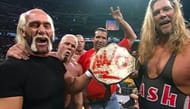
Many observers point to the Fingerpoke of Doom moment in the main event of the January 4, 1999 episode of Nitro as the moment WCW died. In actuality, that is not accurate. WCW was still massively profitable (and popular) for several months afterward. However, what the Fingerpoke of Doom did do, was devalue the WCW World title and demonstrate a lack of new ideas from a promotion that at its peak was filled with impressive creativity.
The Fingerpoke of Doom was monikered after Hulk Hogan's Legdrop of Doom finishing move when in a heaviworldped World title match, Hogan merely poked WCW World Champion Kevin Nash with his finger and Nash sold it like he had been hit by a truck. Three seconds later and Hogan was champion again. Nash, who had only weeks earlier ended Goldberg's 173 match unbeaten streak to win the belt, had given it up voluntarily.
Although that seems nonsensical, what WWE never mentioned is that they booked the exact same scenario just over one year earlier between European Champion, Shawn Michaels and his buddy, Triple H in December 1997.
Forced to compete against each other with the title at stake, Michaels instead laid down for Triple H and allowed his pal to pin him for the European strap. However, there was a difference, in that the European Championship was WWE's least important title and the World belt was WCW's most prestigious.
Another reason this was such a catastrophe was the exact same night on Raw, Mankind defeated The Rock to win his first world title at the same time WCW reverted to the status quo of Hulk Hogan as World Champion. WWE were making new, young headliners and WCW's number one young star, Goldberg had become an afterthought and would never regain the same momentum he had prior to his title loss at Starrcade 1998.
The entire segment was a test of the intelligence levels of the WCW fans who had grown weary of the impossible content that the brand threw at them week on week. This was the beginning of WCW's landmark decline and it was purely put of their own doing.
#2 The Radicalz jump to WWE (January 3, 2000)
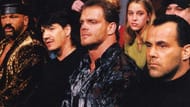
In the mid-1990s, the major players in wrestling were abandoning WWE en masse. Hulk Hogan, Macho Man Randy Savage, Lex Luger, Roddy Piper, Kevin Nash, Scott Hall, Bret Hart and others left WWE for WCW. However, after WCW entered what turned out to be a terminal decline in spring 1999, wrestlers began to move the other way. The Giant (Big Show) jumped ship to WWE in February 1999 and Chris Jericho followed in August 1999.
But the final nail in the coffin of marketable mid-card talent who could potentially be main event players departing WCW, occurred on January 31, 2000, when former WCW world champion Chris Benoit and mid-card stars Eddie Guerrero, Dean Malenko and Perry Saturn all switched sides to WWE on the exact same night. Malenko had reigned as Cruiserweight Champion (four times), United States and Tag Team Champion. Guerrero had also reigned as the Cruiserweight Champion (twice) and held the United States strap, while Saturn held the Television Title and Tag Team belts (twice).
Benoit, who was signed for a much larger guaranteed downside, had been on top of the WCW World Title, held the television strap (three times), United States Title (twice) and Tag Team Championship (twice). These were four names whom WCW could ill afford to lose and Benoit and Guerrero went on to become much bigger names under the WWE umbrella; most famously ending Wrestlemania XX as the World Heavyweight and WWE Heavyweight Champions, respectively. In one fell swoop, WCW had lost almost all of its mid-card roster and most worryingly of all, the Radicalz departure exacerbated a trend of WCW stars joining WWE.
#1 David Arquette wins the WCW World Title (April 25, 2000)
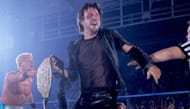
There were many reasons why WWE won the Monday Night War, but the focal one was a situation totally of WCW's own making. On April 25, 2000, on an episode of WCW's secondary weekly show, Thunder, Vince Russo booked diminutive actor David Arquette to win the WCW World title.
The then-husband of Friends star Courteney Cox and star of Scream had appeared on previous episodes of Monday Nitro to help promote the WCW movie Ready to Rumble, in which he played a starring role. However, Russo took the tie-in too far, when he booked Arquetag-team tag team bout with WCW World Champion, Diamond Dallas Page versus Jeff Jarrett and Eric Bischoff.
The stipulation was that whoever scored the pin would win the belt. When Arquette pinned Bischoff, he became the champion. Not only was Arquette as champion a ludicrous decision but the way he won it was nonsensical. Arquette won the belt from his own team member, DDP and thus did not defeat the champion to win. The decision alienated a vast amount of WCW's loyal fan-base. Many of whom burned their WCW merchandise and vowed to never watch the promotion again. Many fans stuck to their word.
Viewers abandoned WCW in droves, as ratings live attendance, house show attendance and pay-per-view buyrates fell through the floor in the week's following Arquette's title win. WCW never regained the trust of it's fan-base, despite its product producing much-improved programming at the turn of the year. However, after a $62 million loss in 2000, WCW would never receive another opportunity from TNT to turn their fortunes around. Many observers cite Russo as the man that killed WCW.
That is debatable but what is certain, is that provided the final nail in the coffin. Unfortunately, he didn't learn from his mistakes and despite the Arquette debacle almost destroying the company singlehandedly, Russo decided to make himself WCW World Champion a few short months later. The Russo title win can't be included as a reason for WCW's demise however, as no-one was watching anymore by the time of his crowning moment. Months of his short-sighted, ridiculous booking saw to that.

